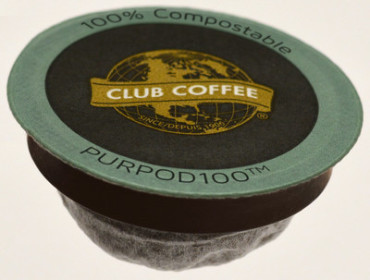
First 100% compostable coffee pods earn certification
By By Carol Neshevich
Food In Canada Packaging Beverages University of GuelphToronto-based Club Coffee created the compostable pods, with the help of University of Guelph researchers

By Carol Neshevich
Consumers who enjoy the convenience of single-serve coffee pods are one step closer to being able to do so without worrying about creating unnecessary waste. Toronto-based Club Coffee has earned Biodegradable Products Institute (BPI) certification for its PῧrPod100, a 100-per-cent compostable single-serve pod for coffee, tea and other hot beverages.
Club Coffee is the first manufacturer to earn BPI certification for single-serve pods. BPI certification requires that products be tested in approved independent laboratories and then be independently verified according to specific scientific standards.
“Third-party certification is important because it validates that PῧrPod100 breaks down in large-scale composting,” says John Pigott, Club Coffee CEO. “Equally important, this external certification tells consumers that they can buy the right solution to the mounting problem of waste and its impact on the environment associated with single-serve formats. It also offers a solution for municipal governments who see a growing number of single-serve pods flooding their landfills.”
This BPI certification confirms that PῧrPod100 is “industrially compostable,” meaning that it fully breaks down in large-scale commercial composting processes. Local governments across Canada are investing in composting processes to divert food and other organic waste to productive uses and away from landfills.
Club Coffee developed PῧrPod100 in collaboration with the University of Guelph’s Bioproducts Discovery and Development Centre (BDDC).
“This is a wonderful example of how research and innovation at the University of Guelph makes a difference around the world,” says University of Guelph president Franco Vaccarino. “We encourage exploration, collaboration and sharing of new ideas to improve people’s lives. This successful partnership highlights how we use our discoveries to produce real solutions to real-life issues.”
A University of Guelph team led by BDDC director Amar Mohanty developed a key PurPod100 component: the ring that holds the pod in place in a brewer is made with coffee chaff, the skin of the coffee bean that comes off during the roasting process. The university filed a patent for this ring formula.
“It’s rewarding to work on a project with an opportunity to make such a positive and widespread impact on the environment,” says Mohanty, a professor in the Department of Plant Agriculture and the School of Engineering and holder of the Premier’s Research Chair in Biomaterials and Transportation. “This innovative coffee pod not only addresses issues of environmental sustainability but also helps reduce greenhouse gas emissions and dependence on non-renewable fossil fuels.”
Print this page